Cocktail Hour
Bad Advice Wednesday: Naming is Knowing
categories: Bad Advice / Cocktail Hour
comments: Comments Off on Bad Advice Wednesday: Naming is Knowing
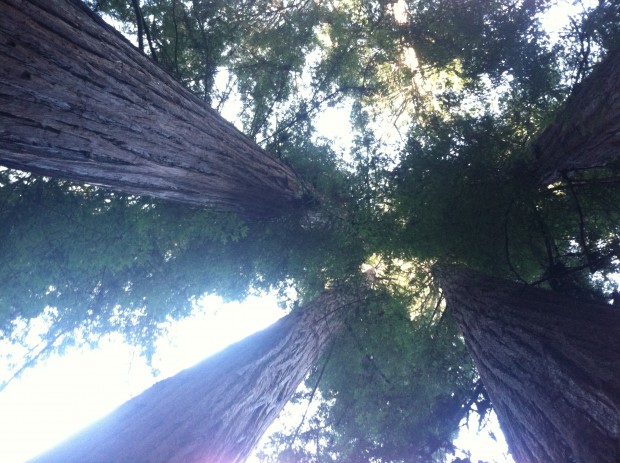
Redwoods
I always noticed it in student work, but you see it in the big-time books, too. “He stood under a tree.” My question as a reader is always: what kind of tree? It’s a lot different standing under a white pine and a white ash. Your feet are in needles in case one. In case two, old leaves. The woods are darker among pines, too. If it’s a Douglas fir, you’re in the Pacific Northwest. What’s the right tree for Tokyo? For Kolkata? For Brisbane? For your town, as well. A bird flies by. What kind? Gray Jay? That tells us something too–those camp robbers like wild places, a bit of elevation. A bug bit him. A bug? Not a mosquito? Horsefly? Blackfly? Was it cloudy? What kind? I like the precision, I guess, but there’s something more, the names of things. And the names of things carry within them states of being, unstated inferences, geographies, even eras, also music, the rhythm of the particular, of a place. Continue reading →
First Sight
categories: Cocktail Hour
comments: Comments Off on First Sight

Since I am heading back to Colorado today it seems the right time to post this tidbit from the second chapter of All the Wild That Remains, “First Sight”:
First Sight
The land buckles and rises.
For a thousand miles it rolls out, sometimes up and down and sometimes flat like a carpet, all the way from the old crumbling eastern mountains. But then comes a kink in the carpet. A big kink. The continent lifts itself up, its back rising, and most homo sapiens who are seeing that lift for the first or second or even the fifty-third time feel a corresponding lift in their chests. A feeling of possibility, of risk, of excitement.
That was what I felt, at least, as the West announced itself. What had been a sometimes imperceptible rise for the last few hundred miles suddenly became an undeniable one. The continent convulsed and lifted, mountains thrusting into the sky.
It is an inherently American moment. The same moment that trappers and early pioneers wrote about in their diaries. That mystical moment when East becomes West. The place where the country finally gets bored with itself and reaches for the sky.
Here is the eighteen-year-old Ed Abbey’s reaction upon first seeing the sight he had dreamed of: “There on the western horizon, under a hot, clear sky, sixty miles away, crowned with snow (in July), was a magical vision, a legend come true: the front range of the Rocky Mountains. An impossible beauty, like a boy’s first sight of an undressed girl, the image of those mountains struck a fundamental chord in my imagination that has sounded ever since.” Continue reading →
Table for Two: Debora Black Interviews Abigail Thomas
categories: Cocktail Hour / Table For Two: Interviews
comments: 2 comments
![Abigal Thomas [photo by Jennifer Waddell]](http://billanddavescocktailhour.com/wp-content/uploads/2015/04/Abigal-Thomas-Credit.-Jennifer-Waddell-412x620.jpg)
Abigal Thomas [photo by Jennifer Waddell]
Love can accommodate all sorts of misshapen objects: a door held open for a city dog who runs into the woods; fences down; some role you didn’t ask for, didn’t want. Love allows for betrayal and loss and dread. Love is roomy. Love can change its shape, be known by different names. Love is elastic.
And the dog comes back.
This is the best definition of love I’ve ever heard. It’s beautiful. Poignant (for the person who has read your book), except that it’s stronger than that, in control of itself. And then so practical and funny at the end, this dog love. All I could do was close the book, and hold it to my chest while all of the emotions and thoughts flooded through. The total of which has me wondering this: When you write, do you sense the quiet power of what you’re writing? Is it something that forms on its own from an unconscious space or do you construct it purposefully?
Abby: First, thank you for saying such extremely nice things. It’s not really a conscious choice, the way I write, except when I revise to make it succinct. I love what you said about its forming on its own from an unconscious space. That describes exactly what writing is like. Continue reading →
Bad Advice Wednesday: Don’t Read Your Reviews
categories: Cocktail Hour
comments: 2 comments
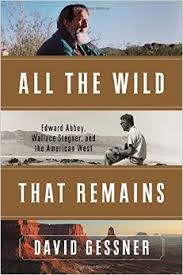 Many writers have claimed they don’t, Papa H. included. But I don’t have the discipline to resist myself. And hey, if I did I wouldn’t have gotten to read this one by Nick Romeo in the Christian Science Monitor, which chose All the Wild That Remains as their top book in April:
Many writers have claimed they don’t, Papa H. included. But I don’t have the discipline to resist myself. And hey, if I did I wouldn’t have gotten to read this one by Nick Romeo in the Christian Science Monitor, which chose All the Wild That Remains as their top book in April:
“The massive droughts and forest fires that have scorched large swaths of the American West over the past decade would not have surprised Edward Abbey and Wallace Stegner, two of the region’s greatest 20th-century authors. Stegner was prophetic in articulating the defining scarcity of the environment west of the hundredth meridian: “The primary unity of the West is the shortage of water,” he wrote. Abbey, meanwhile, blamed the greed of those settling the West rather than the landscape itself; he saw in developers a blind pursuit of growth that resembled the “ideology of the cancer cell.”
These two men are the contrasting heroes of a profoundly relevant and readable new book by David Gessner: All the Wild That Remains: Edward Abbey, Wallace Stegner, and the American West. In this artful combination of nature writing, biography, literary criticism, and cultural history, Gessner studies two fascinating characters who fought through prose and politics to defend the fragile ecologies and transcendent beauties of the West.
The “All The Wild” Tour: Rough Draft!
categories: Cocktail Hour
comments: 2 comments
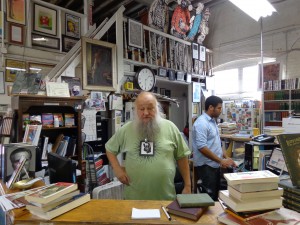 Here is what I got so far. Pardon (or tell me to correct) any mistakes. Just wanted to get something down for now. Come on out and see me!
Here is what I got so far. Pardon (or tell me to correct) any mistakes. Just wanted to get something down for now. Come on out and see me!
Monday, 5/4: 7 pm Changing Hands event in Phoenix
Tuesday, 5/5: 7:30 pm event at Boulder Bookstore
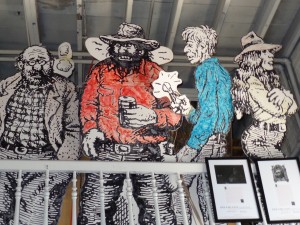
Wednesday 5/6 Tattered Cover Denver, CO
Friday May 8. 7:30 pm. Oregon State. Corvallis. Valley Library.
Saturday May 16. 7 – 8:30 PM.
Wenatchee Valley College Wenatchee, WA 98801
At the Grove, which is the recital hall at the Music and Arts Center:
Sunday May 17th Birdfest Leavenworth, WA ,
noon to 1:30 PM: talk osprey at the Wenatchee River Institute Barn Learning Center.
Monday 05/18: Portland 7 :30 PM POWELL’S BOOKSTORE
Tuesday 05/19: Seattle 7:00 PM ELLIOTT BAY BOOK COMPANY
Wednesday 05/20: Bellingham, Washington 7 :00 PM VILLAGE BOOKS
Thursday 05/21: Seattle THIRD PLACE BOOKS
Wednesday June 10
Collected Works Santa Fe, NM
Thursday June 11
Maria’s Bookstore Durango, CO
Friday June 12
Back of Beyond Moab, Utah
Saturday June 13
Reading Between the Covers
Telluride, CO
Thursday June 18
Bookworms of Edwards
Edwards, CO
June 21
Minnesota Northwoods Writers’ Conference 2015
Thurs July 16
Rumors Coffee and Tea
Crested Butte
Sat July 18
King’s English Salt Lake City
Tuesday July 21
Elk River Books
Livingston, Montana
Wednesday July 22
Bozeman, Country Bookstore
Friday July 24
Indigo Bridge, Lincoln, Nebraska
Bad Advice Wednesday, Earth-Day Edition: Cross Borders!
categories: Cocktail Hour
comments: 2 comments
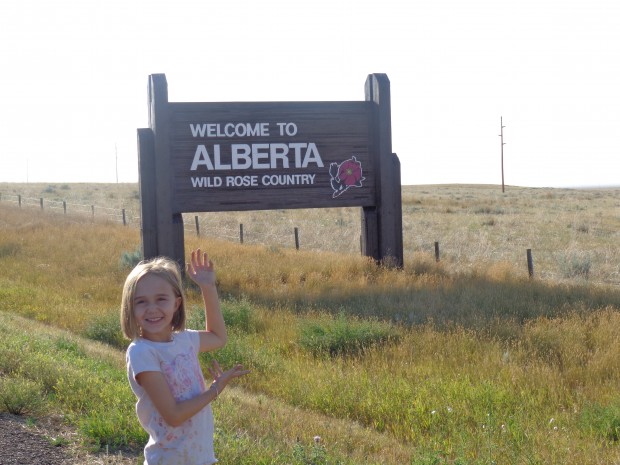 Here was the phone conversation, as recounted later by my wife.
Here was the phone conversation, as recounted later by my wife.
“Is this Nina de Gramont, mother of Hadley Gessner?’ asked the Canadian Border Officer.
“Yes it is.”
“Does Hadley Gessner have permission to cross into Canada with David Gessner?”
“Yes, she most certainly does.”
“Well, that’s good because they crossed the border about half an hour ago.”
Nina and I had been unaware that any single parent crossing the border with a child needs a letter from the absent parent. So Hadley and I ended up in the Border Patrol office, talking with the officer for close to an hour while he tried Nina’s phone again and again. At the end of that hour, the officer had learned some things, including how Labrador Retrievers got their name–they were originally from Newfoundland but that name was taken so they were named after the surrounding sea—and was also pretty sure that Hadley was not being kidnapped. Continue reading →
Lundgren’s Lounge: “All the Wild That Remains,” by David Gessner
categories: Cocktail Hour / Getting Outside / Reading Under the Influence
comments: Comments Off on Lundgren’s Lounge: “All the Wild That Remains,” by David Gessner
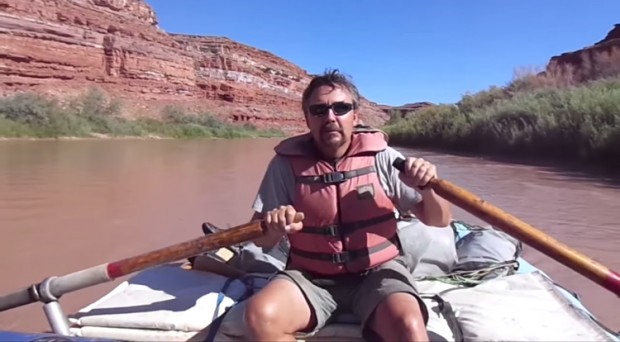
The natural world is out of balance. That much is clear to all but the most myopic among us. Global warming, annual ‘once-in-a-lifetime’ weather events, water scarcity, toxic pollution, species extinction… the list is a depressing drumbeat foretelling catastrophe. Yet despite this impending crisis the environmental movement seems to have lost its mojo. Where are the iconic leaders of this generation, the Ed Abbeys and the Wallace Stegners, wordsmiths who could awaken a movement with their well-chosen words? Continue reading →
The Spill and the Drought: Restraint, Regulation, and This Beautiful Country
categories: Cocktail Hour
comments: 4 comments
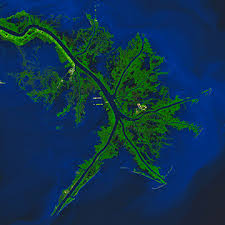 Today is a doubly significant day for me. It is both the pub day for my new book about the American West and the fifth anniversary of the BP oil spill in the Gulf of Mexico. One of the pleasures of writing the book was spending a few years studying not just the work but the thinking of Wallace Stegner, and Stegner wouldn’t have wasted too much time making the connection between the drought in California and the spill in the Gulf. That they can be connected, and not just by the one-size-fits-all cudgel called climate change, seems obvious enough. Both events push us to think harder about resources and energy, not in a cliche or soft manner but in a real way, and in both cases both are deeply tied to the specific geographies of the places: one a near-desert that has long been in denial about its own aridity, and the other a near-tropical wonderland that has been long treated as a dumping ground and resource colony.
Today is a doubly significant day for me. It is both the pub day for my new book about the American West and the fifth anniversary of the BP oil spill in the Gulf of Mexico. One of the pleasures of writing the book was spending a few years studying not just the work but the thinking of Wallace Stegner, and Stegner wouldn’t have wasted too much time making the connection between the drought in California and the spill in the Gulf. That they can be connected, and not just by the one-size-fits-all cudgel called climate change, seems obvious enough. Both events push us to think harder about resources and energy, not in a cliche or soft manner but in a real way, and in both cases both are deeply tied to the specific geographies of the places: one a near-desert that has long been in denial about its own aridity, and the other a near-tropical wonderland that has been long treated as a dumping ground and resource colony.
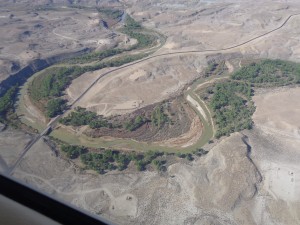
As I thought about the two places, after dropping my daughter off at school, I also found myself thinking about that most un-sexy and un-American of topics: regulation. When conservatives rail against “regulation” they are tapping into a very deep vein in the American psyche. It is an American myth that we still are what we once were. To put it in psychological terms, it is the desire to be young again. To be a muscular young country that spilled over with resources to be exploited and land where few lived. To continue the metaphor, moderation is to the human life what regulation is to the country’s. As you get older you know your limits. You use discipline and restraint, tools to make the best out of what you now have. Of course the myth of limitlessness–no restraint necessary!–is a lot more exciting. It’s no wonder many still cling to that dream instead of looking our reality in the eye. Continue reading →
Salon’s Excerpt This Sunday Morn
categories: Cocktail Hour
comments: 1 comment
Wallace Stegner and Edward Abbey have never been more relevant in the drought-stricken West
In this overheated, overcrowded world, the books of these “reluctant environmentalists” can be our guides
 EnlargeWallace Stegner, Edward Abbey (Credit: Chuck Painter/Stanford News Service; Susan Lapides)
EnlargeWallace Stegner, Edward Abbey (Credit: Chuck Painter/Stanford News Service; Susan Lapides)It was 2012, a summer of fires and fracking. The hottest summer on record, they said, with Midwest cornfields burnt crisp and the whole West aflame, a summer when the last thing a card-carrying environmentalist would want to be caught dead doing was going on a nine-thousand-mile road trip through those parched lands.
I loved the West when I lived there, finding it beautiful and inspiring in the way so many others have before me, and at the time I thought I might live there for the rest of my life. But circumstances, and jobs, led me elsewhere. It nagged me that the years were passing and I was spending them on the wrong side of the Mississippi. But I followed the region from afar, the way you might your hometown football team, and the news I heard was not good. A unique land had become less so, due to an influx of people that surpassed even the Sunbelt’s. The cries of “Drill, Baby, Drill!” might be loudest in the Dakotas, but they echoed throughout the West. The country’s great release valve suddenly seemed a place one might long to be released from. And now the fires, biblical fires, wild and unchecked, were swallowing up acreage comparable to whole eastern states.
It was a summer much like this summer promises to be, with historically low snowpacks, in the Sierras this time, not the Rockies, and early fires. READ THE REST AT SALON.COM





